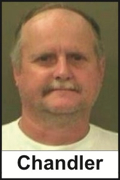Rascals case in brief
In the beginning, in 1989, more than 90 children at the Little Rascals Day Care Center in Edenton, North Carolina, accused a total of 20 adults with 429 instances of sexual abuse over a three-year period. It may have all begun with one parent’s complaint about punishment given her child.
Among the alleged perpetrators: the sheriff and mayor. But prosecutors would charge only Robin Byrum, Darlene Harris, Elizabeth “Betsy” Kelly, Robert “Bob” Kelly, Willard Scott Privott, Shelley Stone and Dawn Wilson – the Edenton 7.
Along with sodomy and beatings, allegations included a baby killed with a handgun, a child being hung upside down from a tree and being set on fire and countless other fantastic incidents involving spaceships, hot air balloons, pirate ships and trained sharks.
By the time prosecutors dropped the last charges in 1997, Little Rascals had become North Carolina’s longest and most costly criminal trial. Prosecutors kept defendants jailed in hopes at least one would turn against their supposed co-conspirators. Remarkably, none did. Another shameful record: Five defendants had to wait longer to face their accusers in court than anyone else in North Carolina history.
Between 1991 and 1997, Ofra Bikel produced three extraordinary episodes on the Little Rascals case for the PBS series “Frontline.” Although “Innocence Lost” did not deter prosecutors, it exposed their tactics and fostered nationwide skepticism and dismay.
With each passing year, the absurdity of the Little Rascals charges has become more obvious. But no admission of error has ever come from prosecutors, police, interviewers or parents. This site is devoted to the issues raised by this case.
On Facebook
Click for earlier Facebook posts archived on this site
Click to go to
Today’s random selection from the Little Rascals Day Care archives….
Click for earlier Facebook posts archived on this site
Click to go to
Today’s random selection from the Little Rascals Day Care archives….
Court cracks door – can Junior fit through it?
 Aug. 15, 2012
Aug. 15, 2012
The North Carolina Supreme Court won’t release its next batch of opinions until August 24, but its recent decision on a 2009 child sex abuse case could augur well for Junior Chandler.
On June 14 the court upheld the North Carolina Court of Appeals’ overturning of Patrick Loren Towe’s conviction in Surry County. Here’s the crucial part of the opinion:
“Under the North Carolina Rules of Evidence, a qualified expert may testify as to her opinion in her field of expertise if the testimony will assist the jury in understanding the evidence. An expert may not, however, testify as to the witness’s credibility or state that she believes the defendant is guilty.
“In sexual abuse cases involving child victims, an expert may not testify that sexual abuse has occurred without physical evidence supporting her opinion. An expert may not testify that the child has been ‘sexually abused’ if the testimony is based solely on the interview with the child-victim.”
In Patrick Towe’s case, only one expert witness so testified – in Junior Chandler’s it was six.
Without such a parade of “expert vouching,” Junior surely would have spent the past 25 years back home in Madison County instead of behind bars. How can the North Carolina Supreme Court now fail to acknowledge this?
C’mon, Dr. Kluft, aren’t you proud of your role?
 Feb. 24, 2014
Feb. 24, 2014
Why would Dr. Richard Kluft “take exception to” and “(raise) the issue of legal liability” over “When Psychiatry Battled the Devil”?
It’s not as if the record of Kluft’s involvement in promoting “satanic ritual abuse” and “multiple personality disorder” could be any longer or better-documented.
And it’s certainly not as if he has ever acknowledged the error of his ways.
In this exchange from a 2009 interview on CBS “Sunday Morning” he confidently posits a nationwide epidemic of undiagnosed cases of MPD:
Tracy Smith: So do you think that there are, what, thousands of people walking around out there with MPD who don`t even know it?
Kluft: Oh, easily.
Smith: Tens of thousands?
Kluft: Easily.
Smith: Hundreds of thousands?
Kluft: Easily.
Smith: Millions?
Kluft: We might be at that level.
Passing off such fantasy as expertise would be knee-slappingly funny, of course, had it not typified the thinking that fostered scores of wrongful prosecutions and ruined thousands of lives….
I remain baffled – what exactly has Richard Kluft done to deserve such obeisance from Psychiatric Times?
‘The right man’ was the wrong man? No way!
 March 19, 2012
March 19, 2012
In “The Folly of Fools: The Logic of Deceit and Self-Deception in Human Life” (2011), Robert Trivers briefly addresses the causes and costs of the ritual abuse mania.
I asked Trivers, professor of anthropology and biological sciences at Rutgers University, about the role played by prosecutors in such cases:
“Prosecutors are notoriously vulnerable to tunnel vision – i.e., once a suspect has been identified, others disappear from sight; they also need to justify themselves in retrospect.
“I was told by (Innocence Project cofounder Peter J.) Neufeld that even after incontrovertible DNA evidence, 75 percent of the original detectives who came up with (and helped convict) the wrong person still say they believe they got ‘the right man.’ ”
Newspaper saw Kelly conviction as ‘breakthrough’
Oct. 2, 2013
“…It’s understandable that this week’s conviction of former day-care center owner Robert Fulton Kelly Jr. in Farmville, N.C., is being hailed as a breakthrough…. The conviction increases public awareness of child abuse, serves notice that children should be taken seriously when they show signs of abuse, and calls attention to improved methods of handling such prosecutions.
“Since another long and costly child abuse case at a California day-care center nearly a decade ago that ended less conclusively than the one in North Carolina, prosecutors have learned much. They have learned how to question children without prompting them, have developed better investigative methods, and have improved the coordination between different agencies.
“But that’s not enough. Parents need to be more alert to detecting possible child abuse and more careful about picking safe, responsible day care centers. Despite this week’s conviction… it would be wrong and unfair to conclude that many day-care workers are degenerates.”
– From “How to Guard Against Child Abuse” in the Deseret News of Salt Lake City (April 25 1992)
During the era of day-care ritual-abuse allegations, most newspaper editorials managed to maintain at least a modicum of skepticism. Not this one – unless you count the Deseret News’ acknowledging a modicum of doubt “that many day-care workers are degenerates.”











0 CommentsComment on Facebook